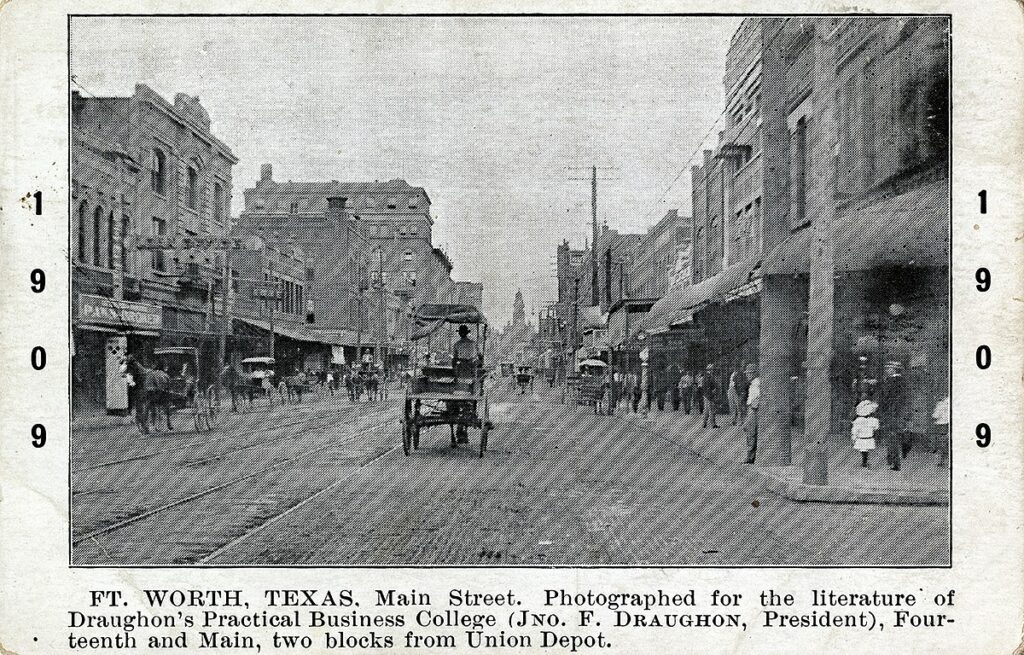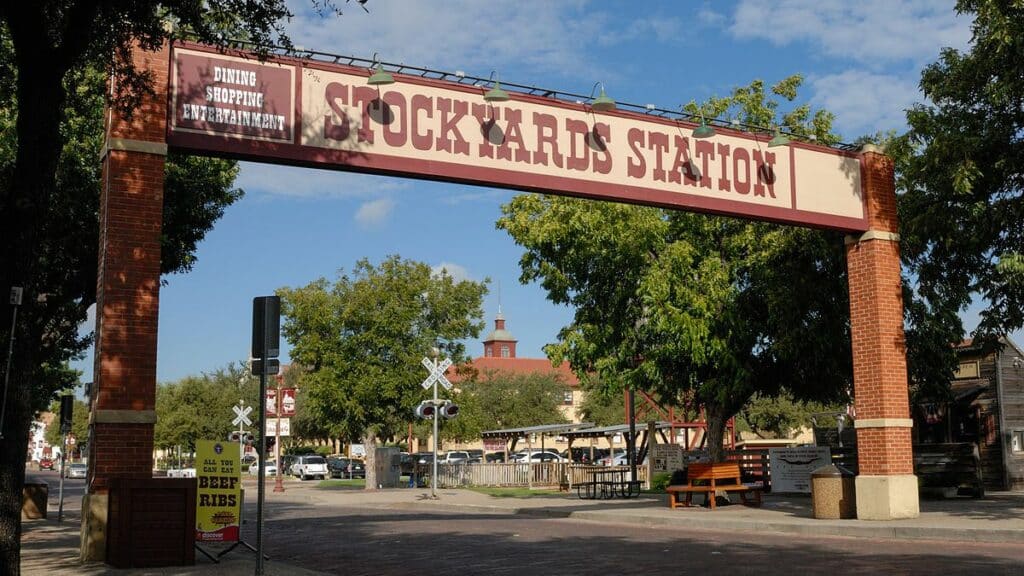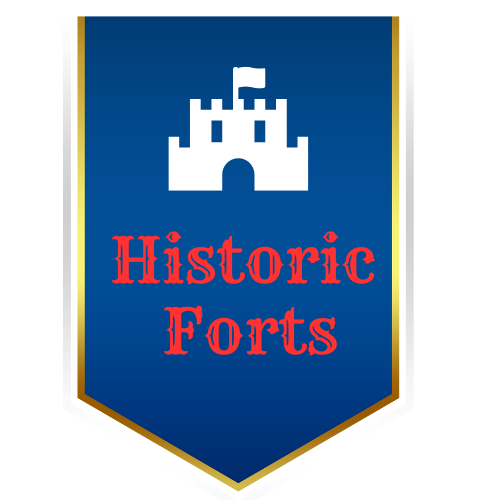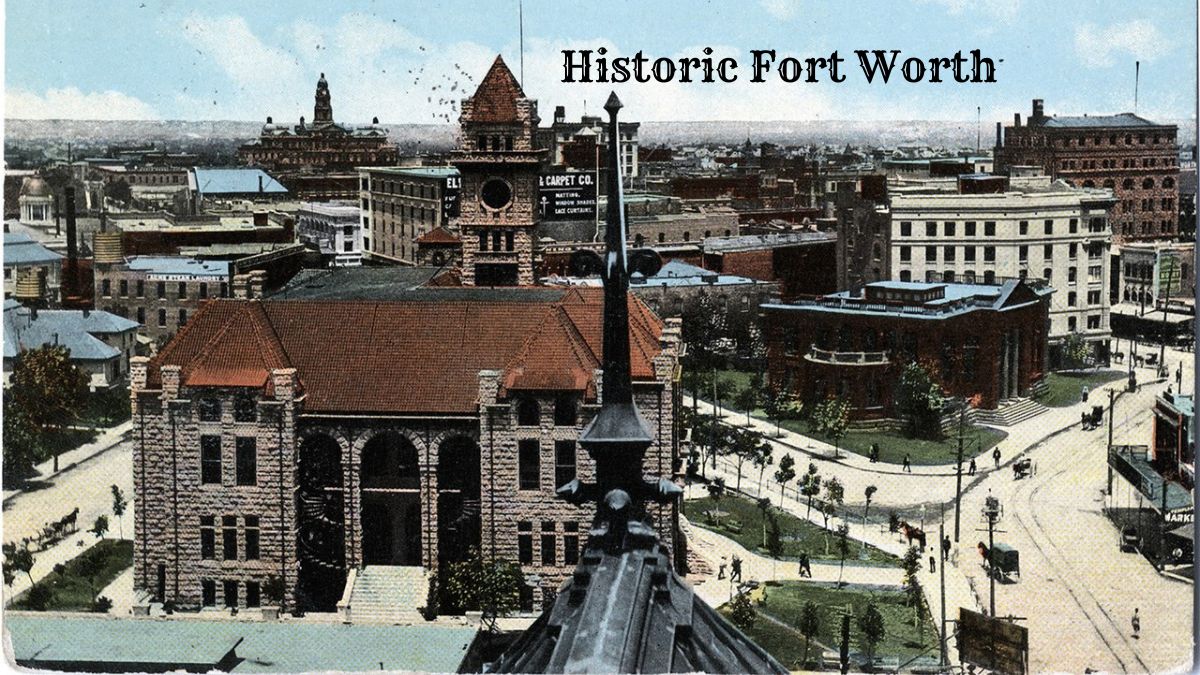Fort Worth, affectionately known as “Cowtown,” offers a journey through time with its architectural treasures and cultural landmarks.
Renowned for its role as a cattle-driving hub, the historic Fort Worth Stockyards remains a vibrant centerpiece, featuring daily cattle drives, rodeos, and themed shops.
The city’s architectural gems, like the Kimbell Art Museum and Thistle Hill mansion, showcase diverse styles and eras. Historic districts such as Fairmount and Samuels Avenue reveal Victorian and Arts and Crafts-style homes.
Fort Worth’s heritage is preserved through dedicated efforts, ensuring its unique charm continues to attract visitors eager to explore Texas’s storied past.
Overview of Fort Worth’s Historic Heritage

Fort Worth, often called “Cowtown,” boasts a rich tapestry of historic sites.
The city is home to various landmarks recognized by the Texas Historical Commission.
The Fort Worth Stockyards serve as a central feature, showcasing the city’s past as a cattle-driving hub.
Visitors can enjoy historic cattle drives, rodeos, and themed shops.
Key Historic Landmarks
- Kimbell Art Museum: Renowned for its architecture and art collections.
- Bass Performance Hall: Famous for its design and cultural importance.
- Thistle Hill: A well-preserved mansion reflecting early 20th-century life.
Historic districts like Fairmount and Samuels Avenue offer glimpses into residential architecture from the late 1800s and early 1900s.
Walking tours here showcase Victorian and Arts and Crafts-style homes.
Numerous museums and theaters enrich the city’s historic heritage.
These venues provide educational experiences and celebrate Fort Worth’s vibrant past.
List of Prominent Sites
- Fort Worth Water Gardens
- Amon Carter Museum of American Art
- The Modern Art Museum of Fort Worth
Preservation efforts by local organizations ensure that Fort Worth’s historic charm endures.
Each site contributes to the city’s unique identity and draws tourists keen to explore Texas’s heritage.
Architectural diversity is evident throughout the city.
Fort Worth’s structures tell a story of growth and change from early American designs to modern influences.
This blend of the old and the new highlights the ongoing significance of Fort Worth’s historic heritage.
Key Historic Sites and Landmarks
Fort Worth boasts many historic sites and landmarks that glimpse the city’s vibrant past.
These locations encapsulate the culture, architecture, and history that have shaped the city over the centuries.
Stockyards: A Living History

The Stockyards is a cornerstone of Fort Worth’s history, reflecting its significance as a livestock center.
The area features old brick buildings, wooden corrals, and the famous cattle drive that happens twice daily.
Attractions include the Stockyards Museum and the Texas Cowboy Hall of Fame, where visitors can learn about the cowboy culture and Western heritage.
Various shops, restaurants, and saloons remain true to the early 20th century, offering an authentic experience.
Thistle Hill: Victorian Splendor
Thistle Hill stands as a prime example of Victorian architecture.
Built in 1904, this mansion exhibits ornate details, intricate woodwork, and exquisite stained glass.
It was originally the home of Electra Waggoner, a member of one of the most influential families in Texas.
The house’s lavish design and expansive gardens provide a visual treat and a window into the affluence of early 20th-century Fort Worth society.
Guided tours reveal fascinating stories and a glimpse into the era’s lifestyle.
Ball-Eddleman-McFarland House: Architectural Gem
The Ball-Eddleman-McFarland House is an architectural masterpiece located in Fort Worth’s Quality Hill neighborhood.
Built in 1899, the house showcases Romanesque and Victorian elements with its red brick facade, gabled roofs, and intricate detailing.
It was home to several prominent families and now operates as a museum.
The house’s well-preserved interiors and furnishings offer insights into the elegance and sophistication of the time.
Visitors can explore various rooms that reflect the period’s design ethos and domestic arrangements.
Cultural District: Art and History Converged
The Cultural District is a hub where art and history intersect.
It houses several museums, including the Kimbell Art Museum and the Amon Carter Museum of American Art.
Each institution offers a rich collection of artworks and historical artifacts.
The district’s architecture ranges from classical to modern, reflecting the evolution of cultural tastes in Fort Worth.
The National Cowgirl Museum and Hall of Fame, which celebrates the contributions of women in the American West, also resides here.
Various parks and gardens make it an inviting educational and leisure area.
Preservation Efforts and Awards
Efforts to preserve Fort Worth’s historic fabric have been extensive, leading to recognition and guidelines that ensure sensitive restoration and construction.
Historic Fort Worth: Stewardship and Recognition
Historic Fort Worth, Inc. is crucial in managing and maintaining the city’s heritage sites.
By acquiring key properties, they ensure these landmarks are preserved for future generations.
They also offer educational programs to inform the public about the significance of preservation.
Important awards have recognized these efforts.
For example, the Texas Historical Commission grants Preservation Awards, acknowledging exceptional restoration projects and long-term stewardship.
These awards highlight the dedication of individuals and organizations working tirelessly to preserve Fort Worth’s historical legacy.
Design Guidelines and Construction Process
Fort Worth follows specific design guidelines for any alteration or new construction in historic areas to maintain architectural integrity.
These guidelines detail acceptable materials, craftsmanship, and designs to ensure any new work complements existing structures.
The construction process involves rigorous review by preservation committees.
They evaluate proposals, recommend necessary adjustments, and approve plans that adhere to guidelines.
This meticulous process protects Fort Worth’s historical charm and character, ensuring that new developments respect the city’s rich heritage.
Explore More: 10 Historic Forts in Texas: Exploring a Rich Military Heritage
Visitor Information
Historic Fort Worth offers a unique glimpse into the past, with important details such as admission prices, operation hours, and booking information essential for planning a visit effectively.
Admission Rates and Group Deals
Historic Fort Worth provides various admission rates to cater to different visitor needs.
General admission is $10 for adults, $8 for seniors (age 65+), and $6 for children (ages 6-12). Children under 6 can enter for free.
Group rates are available for parties of 10 or more, offering a 10% discount when booked in advance.
For larger groups, guided tours can be arranged for an additional $2 per person.
Tour Packages:
- Standard Tour: $12 per person
- Extended Historical Tour: $15 per person
Operating Hours and Best Times to Visit
Historic Fort Worth operates from Tuesday to Sunday, with Monday being a rest day.
The visiting hours are from 10:00 AM to 5:00 PM from Tuesday to Friday.
On weekends, the hours shift slightly: 11:00 AM to 4:00 PM on Saturday and 1:00 PM to 5:00 PM on Sunday.
The best times to visit are weekdays in the morning when the site is less crowded, allowing for a more relaxed tour.
Special historical reenactments and events often occur on Thursdays and Fridays, adding an extra dimension to the visit.
Holiday Closures:
- New Year’s Day
- Thanksgiving
- Christmas Day
Contact Details and How to Book
Visitors can reach Historic Fort Worth via phone or email for inquiries and bookings.
They encourage making reservations in advance, especially for groups and special tours.
Phone: 123-456-7890
Email: info@historicfortworth.org
Bookings can also be made through their website.
It is recommended that group reservations and special tour requests be made by calling or scheduling via email at least two weeks in advance.
This ensures availability and allows proper planning for an enhanced experience.

Cory is a website owner and content creator who enjoys fishing, history, coin collecting, and sports, among other hobbies. He is a husband and father of four.
Romans 15:4 For whatever was written in former days was written for our instruction, that through endurance and through the encouragement of the Scriptures we might have hope.

